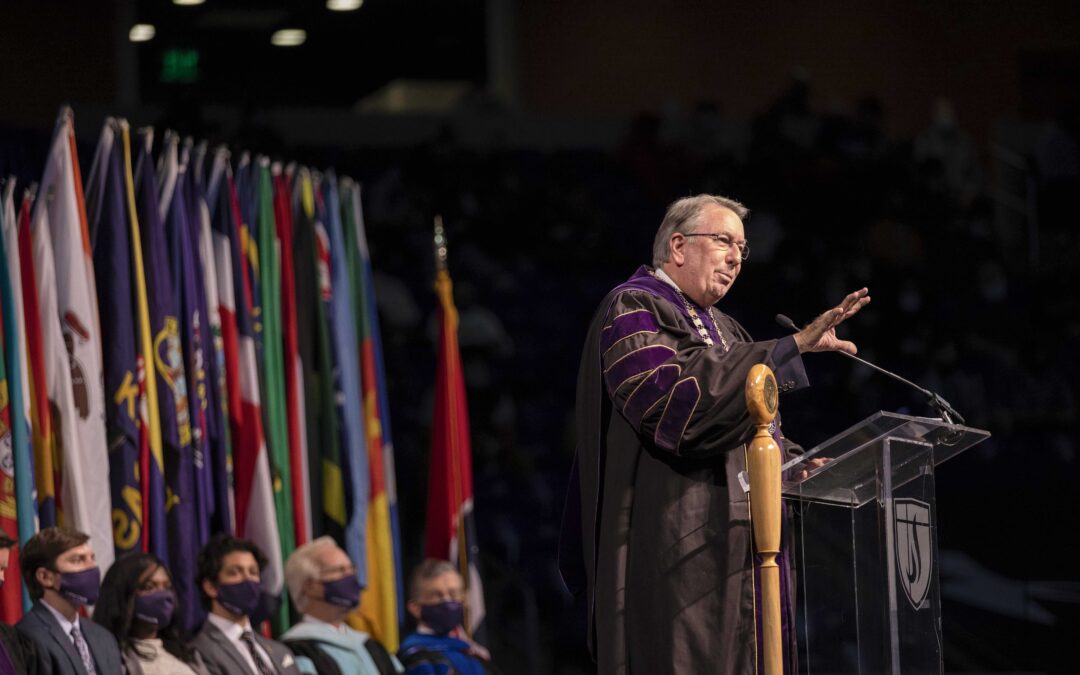President Randy Lowry doesn’t exactly remember his first day at Lipscomb. He does remember sitting in his office for the first week or two and not thinking there was much to be done.
Now, 16 years later, as he prepares to end his time as Lipscomb’s president, he no longer has to wonder, “What am I supposed to be doing?”
“Eventually, we figured that out and the pace picked up,” Lowry told Lumination Network. “Once the pace picked up, it hasn’t paused since then.”
Lowry said there were a lot of emotions he associated with his coming to Lipscomb, including hopefulness for what he could accomplish.
“This Christian college, which is a sister school to Pepperdine where I was coming from, really could and should be the leading university in our church fellowship,” said Lowry. “I was filled with anticipation, very excited and complemented to be here.”
Now, as Lowry steps down as president at midnight tonight and assumes the role of chancellor, he says he’s looking forward to taking a break. He added for context that most university presidents only serve six years.
“After 16 years, if we’re being really honest with ourselves, we’re probably more exhausted than we know. And so I’m going to sleep for the first 10 days,” he said with a laugh.
Lowry said that in the next few months he’ll be taking a working sabbatical in which he wants to take piano lessons, which he hasn’t done since high school. He also said he plans on spending a lot of time with his nine grandchildren, all of whom have been born during his presidency.
“The presidency defines in some sense [my grandchildren’s] relationship with [me]..When I die I don’t want them to call me ‘Mr. President,’ so I’ve got some time to invest there.”
Coming from a role as a tenured law professor, Lowry saw his life being changed very quickly when he became president of Lipscomb. Years later, he can reflect on how his previous experience equipped him for his leadership here.
From organizing conversations between major religious groups in Nashville to responding to the English-only movement to being one of the first to admit DACA students, Lipscomb has become a more inclusive university, with some of the initiatives aided from Lowry’s history with mediation.
Prior to his time at Lipscomb, Lowry worked in conflict management globally and even founded an institute for dispute resolution at Pepperdine. Lowry said that his experience has helped him at Lipscomb in more ways than he had anticipated.
“In a sense I was a mediator then and I’ve been a mediator for 16 more years,” Lowry said. “It’s a different context, but there’s a lot of moments on a college campus. Ideas clash, people clash, cultures clash and we’ve got to be pretty persistent in figuring out can we be the example of diversity.”
As Lipscomb readies for its first female president, Lowry spoke on both the school’s and Nashville’s past and future concerning diversity.
He said that Nashville has a much more varied population that people may see. He added that one out of every nine people in Nashville was born outside of the U.S., noting that the city has the largest Kurdish population outside of the original nation.
“Diversity has been a priority for these 16 years,” Lowry said. “I believe that Nashville is very diverse; it just doesn’t always realize it.”
Lowry encourages students to get out into the city. He said he holds the notion that the “richness of what a city offers and the sense of understanding the world is so much a part of education.”
“Don’t think of your education all happening on 100 acres in Green Hills,” he said. “This is a very diverse city, but it is very possible to live a very segregated and insulated life. I just don’t think that’s very educationally sound.”
Lowry said that Lipscomb is paving the way for many other Christian colleges, especially in the Southeast, for representation in students and faculty.
“This year’s freshman class will be the most diverse freshman class we’ve ever had,” he said. “About 31% represent different ethnic backgrounds.”
Lowry said he believes Dr. Candice McQueen, Lipscomb’s incoming president, is a very experienced individual who will be able to maintain the heart of the school.
“There is something special in this community,” he said. “I think we see that in a million ways almost every day.”
Thanks to Lipscomb’s relatively small undergraduate classes, Lowry says the school is able to grow relationships among faculty and staff that adds a special quality to Lipscomb.
“I think what we have is a sense of a pretty good community where people feel like they can grow and blossom and be formed and prepared.”
Lowry said that students choose to come here because “it feels right,” adding that there’s something about this place that draws people to it, coming from the heart of the school.
“If we can keep the heart, we can keep the community,” he said, “and that competes very well against money and campuses and rankings and all kinds of other things.”
Photo courtesy of Kristi Jones.

